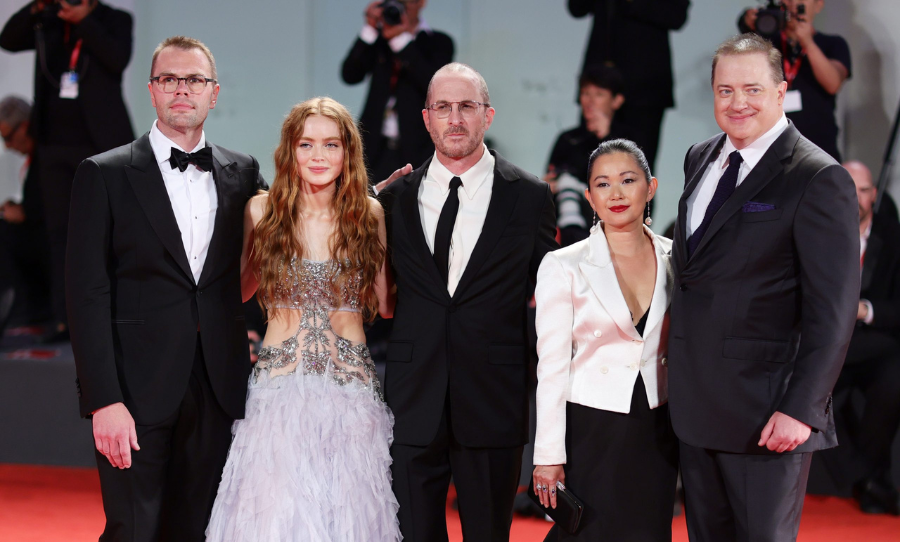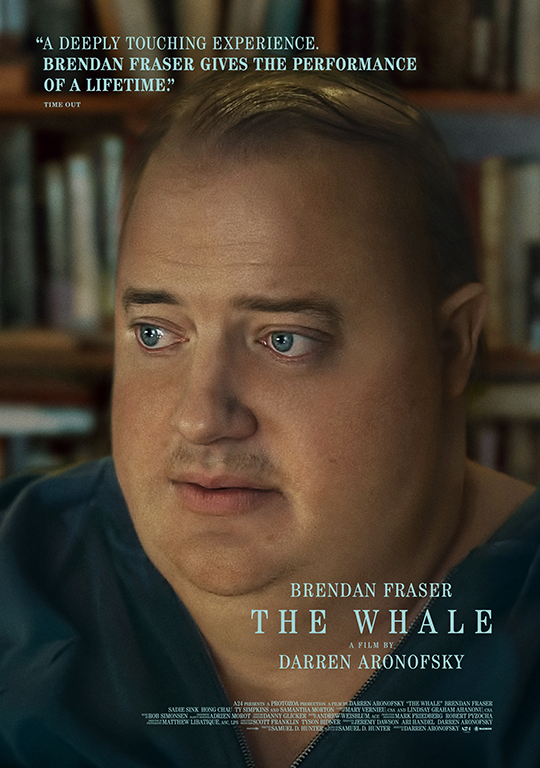By Kai Curry
Northwest Asian Weekly

From right: Brendan Fraser, Hong Chau, director Darren Aronofsky, Sadie Sink, and screenwriter Samuel Hunter.
Brendan Fraser and Hong Chau star in “The Whale,” a film by Darren Aronofsky that has already garnered 16 awards and 54 nominations for more awards. It’s been all over the news as Fraser’s return-to-Hollywood movie, all good feels, all good reviews, as the movie world welcomes back this actor as if he was Marlon Brando when frankly, Fraser was never on the A-list. I like Fraser. It was weird how he disappeared, and I did think he had potential for some great roles—but he wasn’t all that and I’m not sure he is now, though he might be a great guy.
The movie chronicles the sad story of Charlie, played by Fraser, who has secluded himself in his apartment for the years since he lost his boyfriend. Charlie teaches online, but never shows himself to his students. He continuously insists on honesty, and I’m not sure why because everyone around him is brutally honest. His best friend is Liz, played by Chau. We don’t find out for a while why she’s his best friend—and I won’t tell you. Charlie is divorced from his wife and estranged from his daughter, Ellie (Sadie Sink), who is a complete b*tch, until she’s not.
Warning:
Aronofsky has never been afraid to shock you or turn your stomach. The opening scene (I can’t describe it, it would be a spoiler) comes off as gratuitous but it’s not as it actually does a stellar job of telling you almost everything you need to know about Charlie immediately. He can’t stop eating, and he can’t stop what the eating might be a symptom of – mourning – even if it is going to be the death of him, which we find out right away, yes, it is going to be the death of him.
One: I did not cry my eyes out.
Yes, there are obligatory tears. I mean, the guy is dying, my heart is not made of ice, lol. But the obligatory tears didn’t thrill me. What got me were the tears that came whenever someone else in the story was upset—the mom, the daughter, the best friend. When they hug the man that has been a part of their lives for many years, good or bad, who is dying, who won’t do anything about it, and won’t let them do anything about it, the nostalgia sweeps over them. The loss, the cherished memories, along with the pain. Those moments were brief, intense, and beautiful.
Two: Brendan Fraser was not my favorite part.
Electricity accompanies Hong Chau every time she appears on the screen. Born to Vietnamese parents, sheltering at a refugee camp in Thailand, Chau garnered nominations for the 2017 film “Downsizing” and recognition for her role as Lady Trieu in “The Watchmen.” Chau is in the running for a supporting role award for this movie as well. Recently, she starred as the stiff-backed majordomo in “The Meal” and she has a new movie on the way—“Showing Up.”
Chau is a powerhouse of an actor. I hope she will be given all of the recognition she deserves from Hollywood. As Charlie’s best friend, Chau perfectly walks the tightrope between caring, despair, frustration, irritation, and anger. She has a past, too, that we learn of drip by drip, and never completely, and she is fiercely protective of Charlie. Chau is one of those performers where not a single word is wasted. She packs all of herself, all of her character, into every line.
Three: Can we get a non-stereotyped evangelist already?
People are constantly knocking on Charlie’s door. There’s the pizza guy, Liz, his daughter, and a wandering evangelist, Thomas (Ty Simpkins). This guy gets the most backstory in the movie, which is annoying. He is a reincarnation of every squeaky clean, slightly creepy, over-zealous missionary in every story, ever. He’s uncomfortable with everything, and yet consumed by his passion to save souls to the point that he’ll put up with anything that he actually hates. He’s a master faker that won’t give up no matter how many times everyone tells him to go away. My problem with him is that he’s such a stereotype. Not that he doesn’t exist. How much I would have loved if he’d been a long-haired hippy preaching his Gospel instead of this clone.
Four: What or who is the whale?
Throughout the film, whenever Charlie gets upset, he reads from—or has someone read from—a student essay about “Moby Dick” and this calms him down. “Moby Dick,” for me, is one of those stories that’s better in theory than actuality. I love the symbols, but not reading the story. You’ve got Captain Ahab chasing the “white whale,” his nemesis; the narrator, Ishmael; and Queequeg, Ishmael’s friend. In Charlie’s beloved essay, it is mentioned that Ishmael and Queequeg sleep together, implying they might be homosexual, or implying that Charlie makes a connection to that effect. There is a theory about the novel that the whale represents God. Destroying the whale will lead to disaster. This makes sense, in light of the religious persecution Charlie and his boyfriend experienced, or of how the involvement of Christianity in the lives of everyone in this story has messed them up in some way (according to the viewpoint of the story).
 You hate for Charlie to be the whale, but we all get that from the title, right? There are ways it is verified by the movie. The beloved essay mentions that the author feels sorry for the whale as it is just a “poor, big animal” that “doesn’t have any emotions.” Clearly, Charlie is none of these things, yet at one point, this line is read and the camera focuses right on him. Maybe it’s how some people see him. To me, Charlie was the whale in the sense that everything and everyone revolves around him. The essay suggests that “Moby Dick” sometimes concentrates on the whale to distract from the characters’ own sad stories. When everyone is focusing their love, ire, or evangelical passion on Charlie, then they don’t have to face their own lives, their own selves.
You hate for Charlie to be the whale, but we all get that from the title, right? There are ways it is verified by the movie. The beloved essay mentions that the author feels sorry for the whale as it is just a “poor, big animal” that “doesn’t have any emotions.” Clearly, Charlie is none of these things, yet at one point, this line is read and the camera focuses right on him. Maybe it’s how some people see him. To me, Charlie was the whale in the sense that everything and everyone revolves around him. The essay suggests that “Moby Dick” sometimes concentrates on the whale to distract from the characters’ own sad stories. When everyone is focusing their love, ire, or evangelical passion on Charlie, then they don’t have to face their own lives, their own selves.
Wait. Could Charlie be God?
Five: Maybe there are only so many stories to be told.
After a while, you see the same stories more than once. I’m overjoyed about increasing representation in Hollywood—of race, culture, ability, or, in this case, sexual preference. Given this, I was surprised at how “The Whale” was both bold and shy about homosexuality. But I felt like I’d seen this story before. Yes, gays are persecuted by religious intolerance. For those who are religious themselves, it’s a special kind of torture. I wish they’d come out with that message a bit stronger, since we have seen it before—and it does keep happening.
Kai can be reached at info@nwasianweekly.com.


